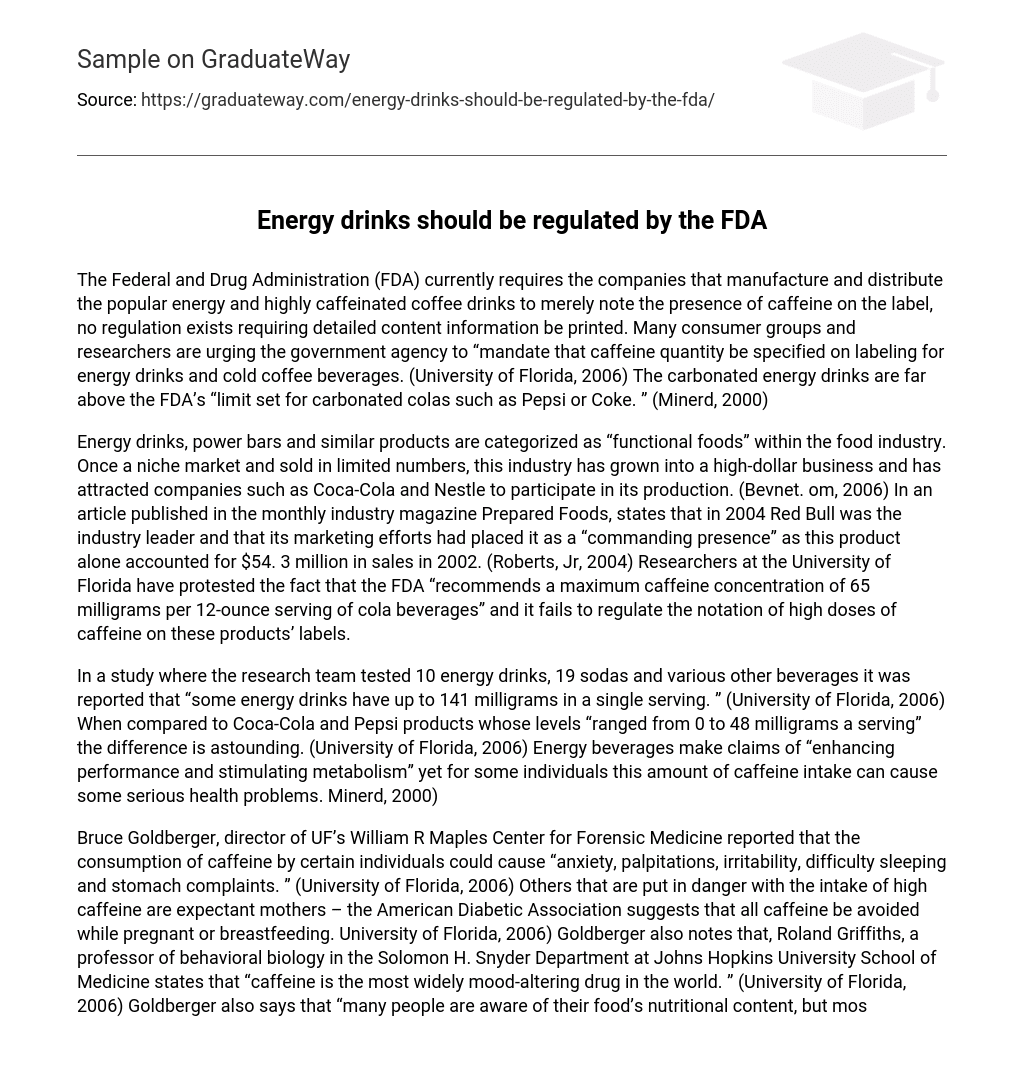The Federal and Drug Administration (FDA) currently requires the companies that manufacture and distribute the popular energy and highly caffeinated coffee drinks to merely note the presence of caffeine on the label, no regulation exists requiring detailed content information be printed. Many consumer groups and researchers are urging the government agency to “mandate that caffeine quantity be specified on labeling for energy drinks and cold coffee beverages. (University of Florida, 2006) The carbonated energy drinks are far above the FDA’s “limit set for carbonated colas such as Pepsi or Coke. ” (Minerd, 2000)
Energy drinks, power bars and similar products are categorized as “functional foods” within the food industry. Once a niche market and sold in limited numbers, this industry has grown into a high-dollar business and has attracted companies such as Coca-Cola and Nestle to participate in its production. (Bevnet. om, 2006) In an article published in the monthly industry magazine Prepared Foods, states that in 2004 Red Bull was the industry leader and that its marketing efforts had placed it as a “commanding presence” as this product alone accounted for $54. 3 million in sales in 2002. (Roberts, Jr, 2004) Researchers at the University of Florida have protested the fact that the FDA “recommends a maximum caffeine concentration of 65 milligrams per 12-ounce serving of cola beverages” and it fails to regulate the notation of high doses of caffeine on these products’ labels.
In a study where the research team tested 10 energy drinks, 19 sodas and various other beverages it was reported that “some energy drinks have up to 141 milligrams in a single serving. ” (University of Florida, 2006) When compared to Coca-Cola and Pepsi products whose levels “ranged from 0 to 48 milligrams a serving” the difference is astounding. (University of Florida, 2006) Energy beverages make claims of “enhancing performance and stimulating metabolism” yet for some individuals this amount of caffeine intake can cause some serious health problems. Minerd, 2000)
Bruce Goldberger, director of UF’s William R Maples Center for Forensic Medicine reported that the consumption of caffeine by certain individuals could cause “anxiety, palpitations, irritability, difficulty sleeping and stomach complaints. ” (University of Florida, 2006) Others that are put in danger with the intake of high caffeine are expectant mothers – the American Diabetic Association suggests that all caffeine be avoided while pregnant or breastfeeding. University of Florida, 2006) Goldberger also notes that, Roland Griffiths, a professor of behavioral biology in the Solomon H. Snyder Department at Johns Hopkins University School of Medicine states that “caffeine is the most widely mood-altering drug in the world. ” (University of Florida, 2006) Goldberger also says that “many people are aware of their food’s nutritional content, but most know little about the ingredients of their beverage. ” (University of Florida, 2006)
This protest for regulation is not a new concept as William Roberts, Jr. otes in his June 2004 article in Prepared Foods. In 2004 Roberts reported that “regulators in Europe are questioning Red Bull, and even this international attention could have negative implications in the U. S. market. ” (Roberts, Jr, 2004) He also noted in his that in Norway, Red Bull is classified as a medicine and all sales had been banned in retail outlets due to the excessive amount of caffeine. (Roberts, Jr, 2004) Unfortunately, the FDA’s reply to researchers and consumer advocates was not positive. Bevnet. om reported that the government agency would have to wait for Congress to“pass legislation to give the agency that authority” before any type of mandate could be put into place. To prove the agency was taking these claims into serious consideration it promised to revisit these claims in 2007. (Bevnet. com, 2006) Protestors have provided accurate documentation to the FDA detailing the elevated amounts of caffeine that supports their claims. Consumers have a right to be informed of the products offered by retailers for human consumption.
Merely stating that caffeine is an ingredient does not supply enough information for the consumer to make an educated choice. Though this dispute has brought a great deal attention to the public there is no guarantee that consumers will be aware of the possible dangers these beverages present. The FDA is charged with regulating products available for human consumption; therefore, it is their duty to ensure that the public is educated by requiring companies that manufacture energy drinks and similar products to keep the public informed.





